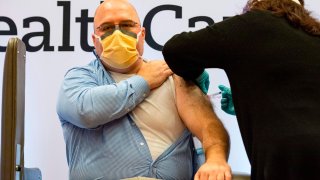
After a shortened session last year, lawmakers are expected to tackle a wide range of issues. However, the pandemic will take priority.
“There’s no shortage of work to do and the pandemic has put a lot more things on a greater priority list than they were before,” said Senate Majority Leader Bob Duff.
This year, that list is long.
“Healthcare has been anything but affordable. The pandemic has shown the cracks,” said his Republican counterpart, Senate Minority Leader Kevin Kelly.
Democrats want to fill some of those gaps with a public option.
“It does drive and bring quality affordable healthcare to the people of this state,” said Duff.
Duff said several government-run insurance bills will likely be on the table. Kelly said they’ll all be job killers.
Local
“We’re the insurance capital of the world. So, I really don’t understand why the Connecticut Democrats would want to not only take on that industry but ruin good-paying middle-class jobs,” he said.
Instead, Kelly said Republicans will re-propose their reinsurance program which incentivizes insurance companies to take on clients they otherwise wouldn’t by sharing the risk. He believes the plan provides as much relief on the cost of premiums as the public option while also targeting the overall cost of medical care.
“It’s better because it keeps the Connecticut jobs and part of it gets its arms around the real cost drivers which is the high cost of medical care,” he said.
More people are forgoing in-person doctor's visits and logging on to their computers instead. That’s why telehealth will also get attention from lawmakers this session.
“It’s been extremely popular, it’s really helped people get access to healthcare,” Duff explained.
“We need patient-centered care,” Kelly added. You want to make sure there’s an incentive for medical providers to give and to service vulnerable populations but at the same time, you don’t want this medium to replace the quality in-person.”
Lawmakers will also be asked to extend the governor’s executive orders that expire on Feb. 9. Democrats say they’ve had informal talks with the governor’s office, while Republicans say they haven’t been included.
“It’s going to be very important to continue with our mask mandate and other types of ways the executive orders matter such as vaccine distribution, foreclosure prevention, there’s a balance there for sure and those conversations are ongoing, said Duff.
“We haven’t been at the table,” countered Kelly. “Our government is not built for one-person rule. The voice of the people went back into the building so to speak and I don’t understand why that voice isn’t at the table.”
Lawmakers will be in session until June, which means issues that have been on the back burner, particularly those dealing with health, like the elimination of the religious exemption for vaccines, will likely get a second look.
“We’re in the middle of a pandemic. If this isn’t the time to act on vaccinations and ensuring that children who go to school are vaccinated so they don’t put others at risk, there’s probably no other time to do this,” said Duff.



